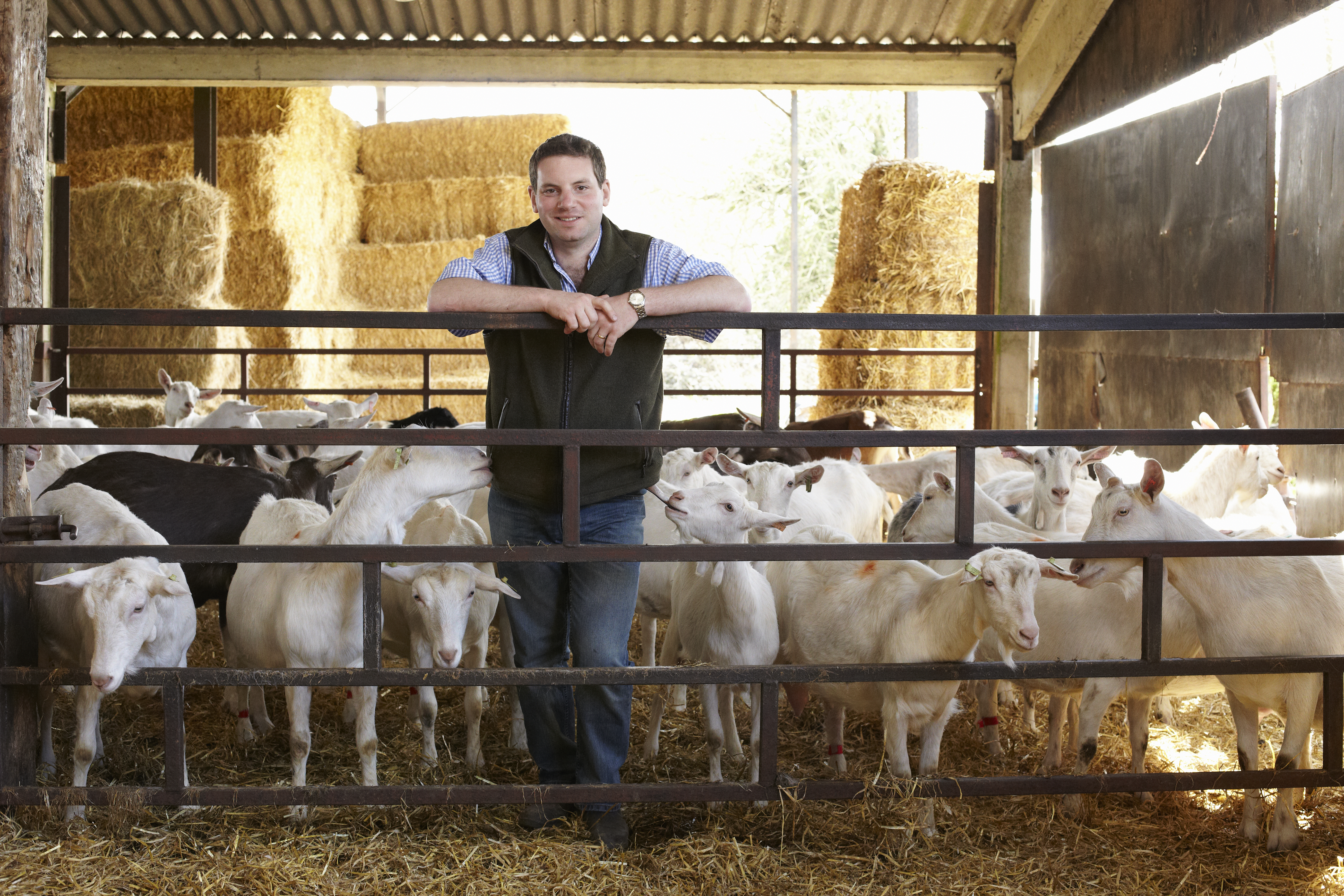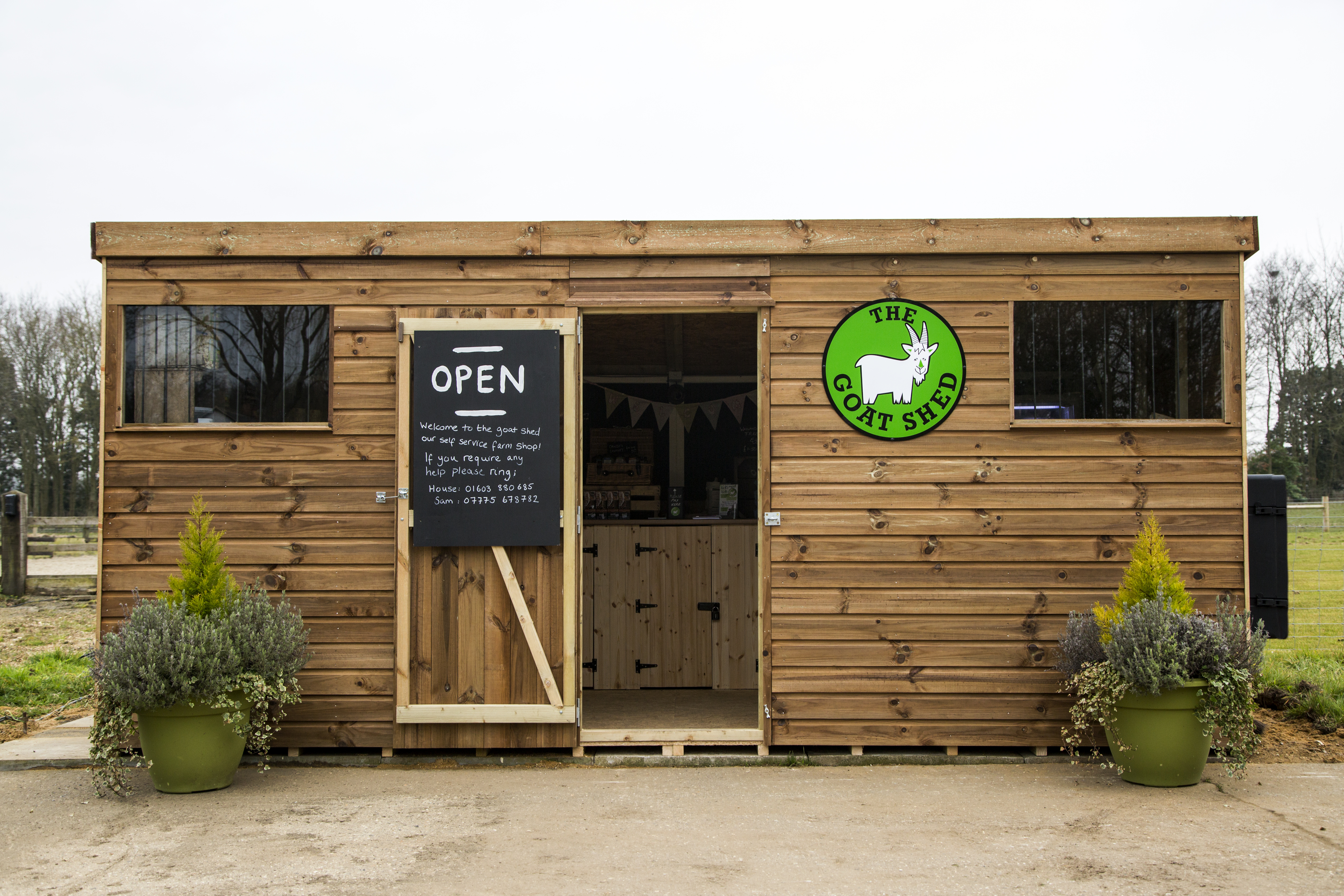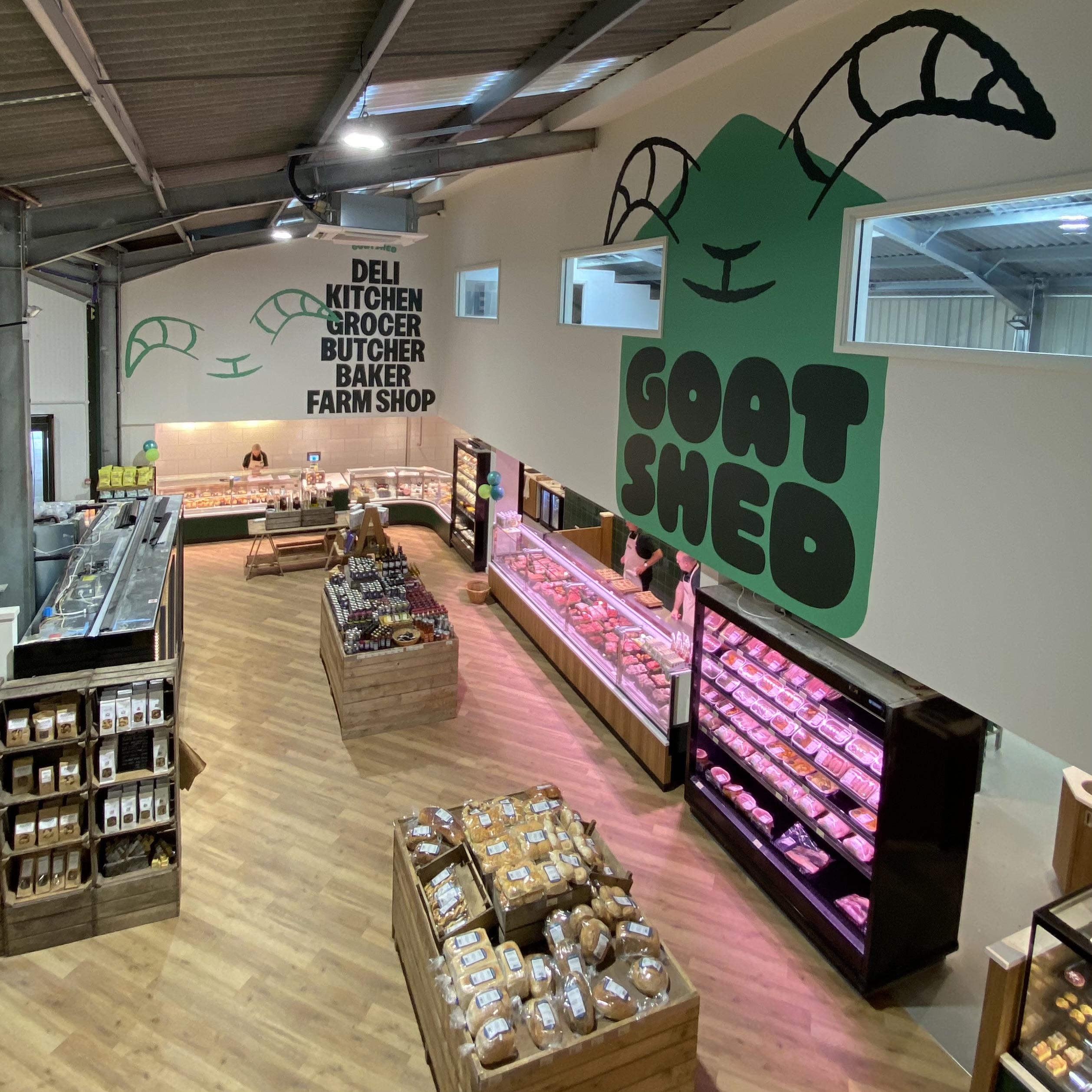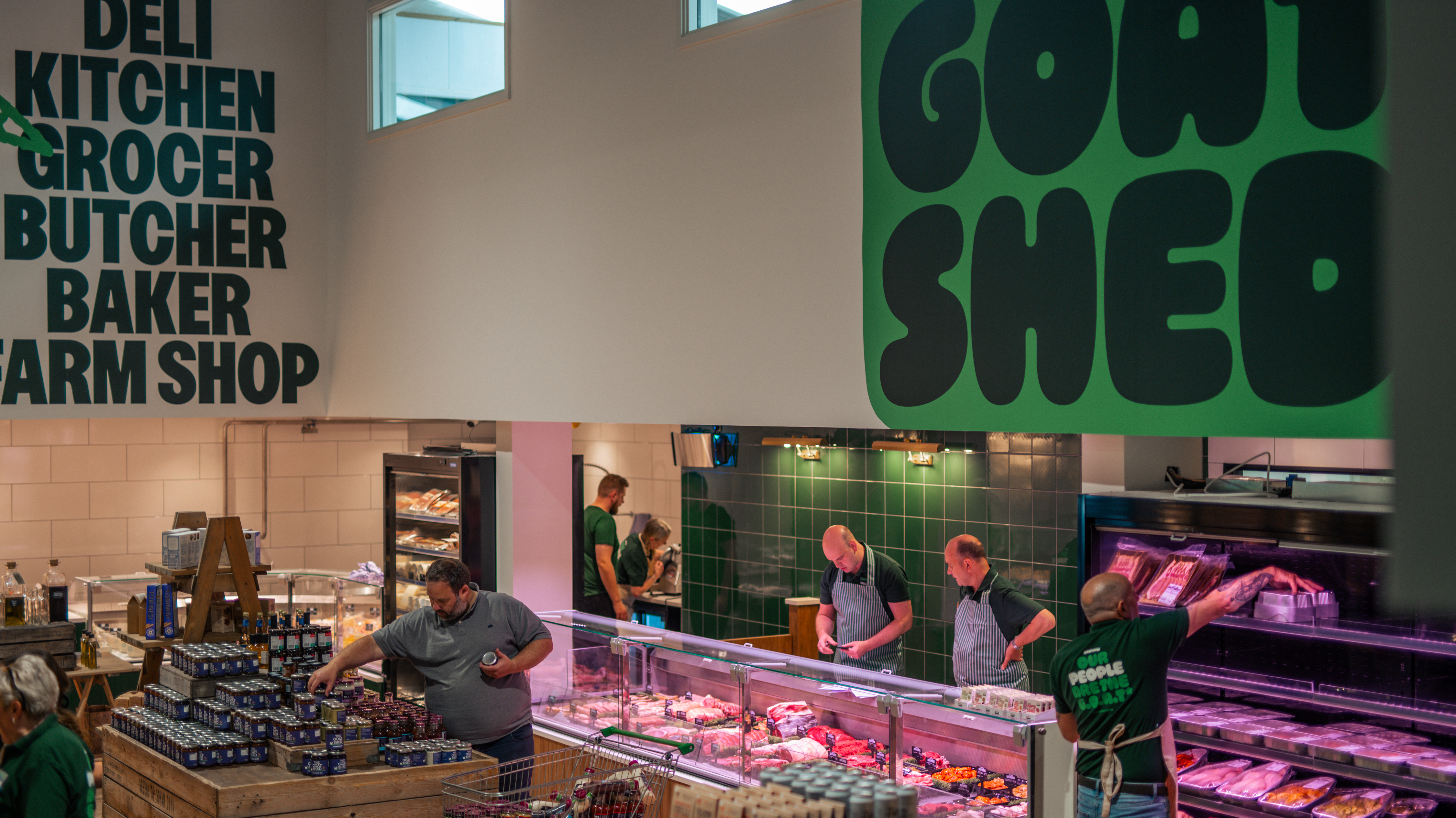Free digital copy
Get Speciality Food magazine delivered to your inbox FREE
Get your free copy
The Goat Shed founder Sam Steggles had no idea what lay ahead as he boarded a plane in 2020, setting off to Australia on the first leg of an enviable global tour as part of a Nuffield Farming Scholarship.
With nothing but a haircut and a dent in his bank balance to show for his (very) whistlestop visit, he was soon called back to the family farm in Norfolk as Covid began to dig its roots in around the world.
For some businesses, the shock of the pandemic was too much to bear. But others thrived. And so begins this tale of growth. But let’s wind back a little first.
The Goat Shed’s life really starts 15 years ago, with Fielding Cottage, and goats’ cheese. “Our cheese is 15 years old this year,” says Sam. “It’s all goats’ cheese. Norfolk Mardler is our more matured cheese, and Wensum White is our take on a goats’ milk Brie. That one’s won several World Cheese Awards!”

Customers back then often asked Sam if they could pop by the farm to buy a piece of cheese. Of course they could. And up went a 6ft x 4ft garden shed with a fridge and an honesty box – the humble beginnings of many a farm shop.
“People would ask us for a bit more, so we put some honey in, or some potatoes – various bits and pieces. And we named it The Goat Shed.”

Still, customers wanted more. So there was an upgrade…to a 16ft x 8ft shed.
Business then was slow. There were regulars, but some days no one would show up. Until Covid.
“Our cheese business was doing really well at the time,” Sam reflects. “And then I managed to secure my Nuffield Farming Scholarship which was titled, The Journey to Maturity Navigating Sustainable Food Business Growth. I wished to look at how businesses grew sustainably and substantially in tricky political and economic times, with an emphasis on recruiting and retaining great people.”
Sam says he jumped on the plane to Oz full of enthusiasm, with a sweeping itinerary including New Zealand, South Africa and China on the cards.
“I left on Sunday lunchtime, and by Wednesday the phone started ringing. I was told a lot of our cheese contracts were being pulled because people were shutting shops, pubs and restaurants. I was in Brisbane at this point. And the next day we worked out we’d lost a significant volume of business, so I went back to the airport to jump on a plane home.”
When Sam arrived, bag and passport in-hand, the airport was, he says, a ghost town. “I was told all the planes were grounded because of a thing called Covid. So I had to go to Trailfinders to buy new tickets, and I literally went around the world to get home the following Sunday.”
The irony that his scholarship thesis was formulated around trading in difficult times isn’t lost on Sam. But, like many of farming stock, he wasn’t prepared to throw in the towel when things got tough.
“My wife told me people couldn’t get toilet roll, pasta or bread when I got home. We had our little goat shed and people kept turning up to see what they could get. I’d speak to them and find out what they were looking for and source it – from people we’d usually stand next to at farmers’ markets, who we knew were supplying various other farm shops or delis.”
The fledgling shop evolved. A table and gazebo were put out front as it got busier. Sam started to record videos, letting would-be and regular shoppers know what was available, and where exactly The Goat Shed was.
With building plans for an expanded cheesemaking facility on hold due to Covid restrictions, soon The Goat Shed would move…. from the shed, into the back of what was essentially a swept out barn. “It was a kind of pop-up shop,” says Sam. “We could offer more products, we put lots on social media about how we could get in flour, yeast, toilet rolls, bread, milk, meat – all sorts of bits and pieces.”
It was a fascinating insight, he adds, into the fragility of food security in Britain. “All the supermarket shelves were empty! It was a case, really, of supporting smaller local businesses and, fortunately, that’s continued. We’ve got such short supply chains we could get hold of most things.”
As a cheesemaker, with no intention of running a shop, there was panic as the pandemic slowed down. Customers asked if The Goat Shed (in its bigger guise) would continue. “And we said ‘no’,” Sam explains. “We had no plans to run a shop. Cheesemaking is what we knew. But we told people if they would continue to come to us and support us, OK, we’d keep it going. We put up another building and made Goat Shed a proper farm shop, moving everything into there in February 2021.”

By now, The Goat Shed had 8,000sqft, including a kitchen offering tea and coffee, breakfasts, lunch and homemade bakes.
Still, Sam says, this wasn’t enough, and recently the business has doubled its footfall again, so it now encompasses two floors, with additional outdoor space. What was a response to a devastating global event, is now a full-blown family-friendly attraction. Customers are being wowed by the brand-new butchery, complete with walk-in fridge, selling meat slaughtered at an abattoir less than 10 miles away. “We’re making all our own sausages, cutting our own beef, making our own burgers,” Sam says.
There’s an expanded deli too, again loaded with homemade fare. And a kitchen/bakery where everything from sausage rolls to cakes are crafted every single day.
Not bad for what was a little cheese shed on a rural road.
“We now have about 50 people in the team,” Sam says proudly, adding that The Goat Shed really has become a destination, and it’s been important to view it as a ‘whole family’ day out, with plenty to keep visitors on site, increasing dwell time. “People can come and see the goats and cows. We’ve opened up a maize maze as a direct result of customers asking us for a bit more for children to do. And we’ve pulled an old horse box from the nettles and converted it to sell teas, coffees and ice creams to take away and enjoy in the paddock between The Goat Shed and our cow shed.”
Customers are now visiting “for a few hours at a time. For a morning out. They’re meeting up here for coffee and catch-ups or business breaks and meetings. And they’re stopping here on their way home to buy supper.”

Farm shops, Sam says, have enduring appeal, and he doesn’t see them going anywhere anytime soon, especially those that reach out to customers, listen to feedback, and deliver what shoppers want and need.
“A lot of our customers have been on this journey with us,” he says. “They’ve experienced the story, been to the little wooden shed and pop-up shops in the barn. They’ve seen us transform what we’re doing, and they feel invested in us – like they’re part of the journey.
“Not only that, but there’s a real sense of community in what we do. We have Hoof It walks once a month, where we go on a 5km or so walk from The Goat Shed with customers, coming back here for a cup of tea and a brownie. And we offer work experience placements for local children. That education side of things is important to us as well.”
Absolutely critical to the survival of businesses like this is great customer service too. “All our staff are encouraged to talk to customers, not just rattle them through the tills. That’s another thing. We actually have people on our tills. There’s no self-check-out here!”
His advice for anyone else thinking of expanding?
“Talk to others who’ve done it. Get around the country and speak to people. You’ll find they’re open and honest and willing to help. Also, look at your location and competition. Just because someone down the road has been successful with a farm shop, doesn’t mean you can replicate that success if you open one two miles up the road. You might actually dilute what they are doing, and dilute what you are doing.”
Sam wouldn’t turn back the clock. It’s hard work running a farm shop but “if you listen to your customers, and engage with them, it’s very rewarding at the same time.”